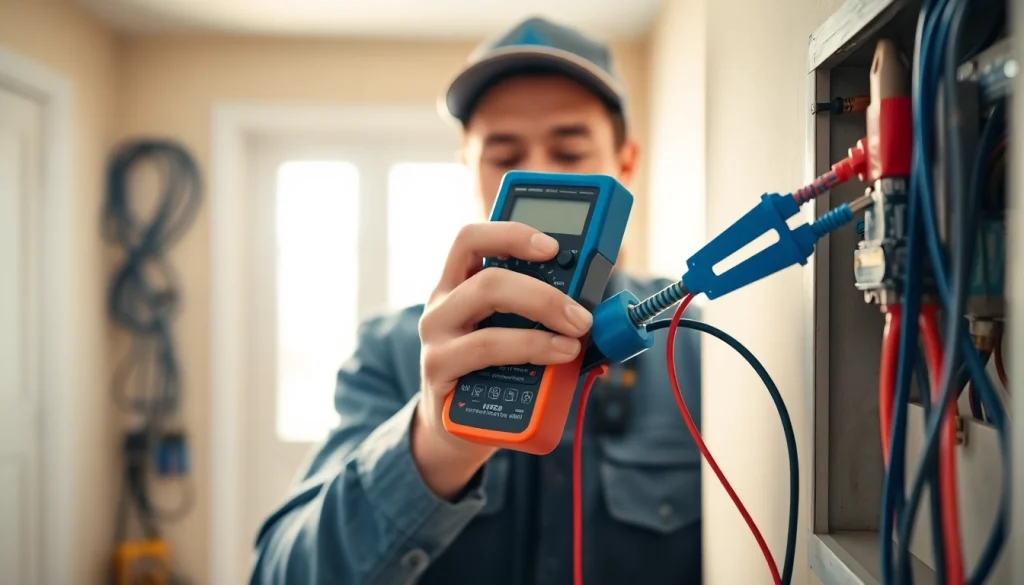Understanding Electrical Service Basics
What is Electrical Service?
Electrical service refers to the delivery of electrical power to homes, businesses, and other facilities. It encompasses a broad range of functions that include the generation of power, its distribution, and the subsequent installation of electrical systems within structures. Understanding electrical service is vital to ensure that your property has a reliable power supply, enabling the practical functioning of all electrical devices and appliances. Most importantly, maintaining a secure and efficient electrical service is crucial for safety and compliance with local regulations.
When residents or businesses inquire about Electrical Service, they typically look for information on installation, repair, upgrades, and preventive maintenance—all critical aspects to keep in mind. The complexity of electrical service can sometimes overwhelm individuals, as it incorporates various electrical components, regulations, and safety measures to reduce hazards.
Components of Electrical Service
The components of electrical service are multifaceted and involve several systems that work together to ensure a steady power supply. Key components include:
- Service Entrance: This is where electricity enters the property from the utility provider. It includes meters for tracking consumption and equipment for disconnecting the service.
- Main Panel: Sometimes referred to as a breaker box, this main electrical panel distributes electricity throughout the property and contains circuit breakers or fuses that protect an electrical circuit from overload.
- Circuit Wiring: Comprised of electrical wires, conduits, outlets, and switches, this system transmits electrical power to various locations in a home or business.
- Grounding System: Vital for safety, the grounding system prevents electrical shocks by providing a safe path for fault currents to return to the ground.
- Back-up Power Systems: Systems such as generators or battery backups ensure a reliable power supply during outages.
Signs You Need Electrical Service
Being aware of the signs that indicate the need for electrical services can lead to timely interventions and prevent serious hazards. Common signs include:
- Frequent Circuit Breaker Trips: If circuit breakers in your home constantly trip, it could imply an overloaded circuit or a more serious issue needing professional examination.
- Flickering Lights: Flickering or buzzing lights can indicate problems such as loose wiring, circuit overload, or malfunctioning switches.
- Burning Smell: Any burning smell around electrical outlets or appliances signifies that you should unplug devices immediately and consult an electrician.
- Old Wiring Systems: If your home has old, outdated wiring, it may not be able to handle modern electrical loads, necessitating an upgrade.
- Overheated Outlets: Outlets that are hot to the touch can signify serious electrical issues compromising safety.
Common Types of Electrical Services
Residential Electrical Service Overview
Residential electrical services cater primarily to individual homes and involve various tasks essential for ensuring functionality, safety, and energy efficiency. These services might include:
- Electrical Installations: New home constructions or renovations often require installation services to set up lighting fixtures, appliance outlets, and wiring from scratch.
- Upgrades and Replacements: This encompasses enhancements to existing electrical systems, such as replacing outdated panels or upgrading to energy-efficient lighting.
- Repairs and Troubleshooting: Experienced electricians are equipped to diagnose and fix problems affecting electrical systems, including flickering lights or malfunctioning outlets.
- Home Safety Inspections: A thorough inspection of the electrical system by professionals ensures safety and compliance with electrical codes.
Commercial Electrical Service Offerings
Electrical services for commercial properties are tailored to meet unique business needs and regulations. This may include:
- Large-Scale Installations: Wiring and installing electrical systems in larger commercial facilities require specific expertise and compliance with codes.
- Energy Management Solutions: Businesses commonly seek energy-efficient solutions, such as the installation of LED lighting or energy monitoring systems.
- Maintenance Services: Regular servicing and preventive maintenance of electrical systems to minimize downtime and avoid significant issues affecting operations.
- Emergency Services: Quick response teams are necessary for commercial settings to address electrical failures and restore power promptly, ensuring business continuity.
Specialized Electrical Services and Upgrades
Specialized electrical services have gained traction, especially in areas where technology and sustainability intersect. Key offerings include:
- Solar Panel Installations: Eco-conscious homeowners and businesses opt for solar energy to reduce their carbon footprint and energy costs.
- Electric Vehicle (EV) Charging Stations: As electric vehicles grow in popularity, the installation of EV charging stations has become essential for residential and commercial properties.
- Smart Home Integration: Upgrading to smart technologies that allow users to control lighting, HVAC, and security systems through integrated platforms.
- Data and Communication Cabling: Installing specialized cabling for internet, telephone, and data transfer, ensuring robust connectivity.
Selecting a Qualified Electrical Service Provider
What to Look for in an Electrician
When selecting an electrical service provider, it is crucial to assess various factors that ensure quality and reliability. Look for:
- Licensing and Certification: Always verify that the electrician holds the necessary licenses and certifications required by local laws and standards.
- Experience and Specialization: Choose electricians with adequate experience and specialists in the specific services you require (residential, commercial, specialized).
- References and Reviews: Positive reviews and testimonials from past clients can provide insights into their reliability and quality of service.
- Insurance Coverage: A professional electrician should have liability insurance to protect against potential damages during their work.
Questions to Ask During Consultations
During the initial consultation with an electrician, asking the right questions can clarify expectations and ensure you’re selecting the best provider. Consider asking:
- What is the expected timeline for the project?
- Can you provide a written estimate before starting?
- What warranties or guarantees do you offer on your work?
- How do you handle unexpected issues or costs that arise during a project?
Understanding Licensing and Insurance Requirements
Understanding local and state regulations regarding licensing and insurance is fundamental for both safety and compliance. Ensure that any electrician you hire possesses:
- State Licenses: Electricians need to pass examinations and adhere to local codes that govern electrical work.
- Liability Insurance: This protects you and the provider against damages that may occur during the course of work.
- Worker’s Compensation: This covers any injuries that might occur to technicians on your property, protecting you from potential lawsuits.
Cost Considerations for Electrical Services
Factors Influencing Electrical Service Costs
The costs associated with electrical services can vary widely based on several key factors:
- Type of Service: Residential electrical work tends to be less expensive than commercial jobs due to differences in complexity and scale.
- Labor Costs: Electricians typically charge per hour, and rates may vary significantly based on geographic location and the electrician’s experience.
- Materials Used: The quality of materials, fixtures, panels, and wiring can greatly impact the overall project cost.
- Scope of Work: Larger, more complex projects requiring advanced technical skills naturally incur higher costs.
Budgeting for Electrical Service Needs
Creating a budget for your electrical services involves several steps:
- Assessing Your Needs: Determine the specific electrical work required, whether it be installations, upgrades, or repairs.
- Getting Multiple Quotes: Obtain several quotes from different electricians to compare prices and service offerings.
- Including a Contingency: It’s wise to include an additional 10-20% of your budget as a buffer for unexpected costs.
Cost-Saving Tips for Electrical Projects
To maximize your budget while ensuring quality service, consider these cost-saving tips:
- Schedule Off-Peak Projects: Hiring electricians during off-peak times may yield lower hourly rates.
- Invest in Energy-Efficient Solutions: While upfront costs may be higher, energy-efficient upgrades reduce long-term operational costs.
- Regular Maintenance: Preventive maintenance can save money over time by avoiding costly repairs.
- DIY Basics: Small tasks such as replacing fuses or changing light fixtures can be accomplished as DIY, reducing overall project costs.
The Importance of Regular Electrical Maintenance
Benefits of Routine Electrical Service Checks
Regular electrical maintenance is essential for several reasons:
- Safety: Routine checks can uncover potential hazards that may lead to fire or electrocution.
- Performance Efficiency: Performing regular maintenance can ensure that electrical systems are running optimally, which can lower energy costs.
- Compliance: Regular service checks help ensure that your electrical systems comply with safety codes and regulations.
- Prolonged Lifespan: Timely maintenance prevents wear and tear on electrical components, extending their operational life.
Common Maintenance Tasks for Safety and Efficiency
Typical electrical maintenance tasks include:
- Inspection of Wiring: Checking for signs of damage or wear.
- Testing Ground Fault Circuit Interrupters (GFCIs): Regular testing ensures they function properly.
- Reviewing Load Ratings: Ensuring circuits are not overloaded.
- Updating Outdated Fixtures: Replacing old light bulbs and fixtures with modern energy-efficient options.
Creating an Electrical Maintenance Schedule
Implementing an effective maintenance schedule can ensure consistent oversight of your electrical systems. Steps may include:
- Routine Inspections: Schedule inspections at regular intervals (e.g., annually or bi-annually).
- Record Keeping: Maintain a log of all maintenance work performed and schedules for future checks.
- Using Prompts: Set reminders for important maintenance activities to ensure they are not overlooked.



